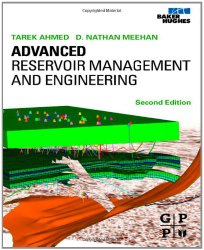Engineering Bookshelf
- Aerospace
- Biological
- Civil
- Chemical
- Environmental
- Electrical
- Materials
- Mechanical
- Petroleum
- Geoengineering
- Software

Advanced Reservoir Management and Engineering
by Tarek Ahmed PhD PE, Nathan MeehanPublisher: Gulf Professional Publishing
ISBN: 0123855489
Check price @ amazon.com , amazon.ca , amazon.co.uk
Book Description
Reservoir management is concerned with the geoscience and reservoir/production engineering required to plan and optimize the development of discovered or producing oil and gas assets. One of the only books to cover both management and engineering issues, Advanced Reservoir Management and Engineering is redesigned to be the only book you need throughout your career. Written by two of the industry's best-known and well respected reservoir engineers and managers, this new edition offers readers a complete guide for formulating workflow solutions on a day to day bases.
Authoritative in its approach, the book begins with the theory and practice of transient flow analysis and offers a brief but thorough hands-on guide to gas and oil well testing. Chapter two documents water influx models and their practical applications in conducting comprehensive field studies, widely used throughout the industry. Essential topics such as Type-Curve Analysis, unconventional gas reservoirs, and gas hydrates are also covered. The book moves on to provide a clear exposition of key economic and financial management methods for evaluation criteria and cash flow analysis, analysis of fixed capital investments and advanced evaluation approaches. This is followed by a frank discussion of advanced evaluation approaches such as integration of decision analysis and professional ethics.
Readers will find the website a valuable guide for enhancing their understanding of different techniques used for predicting reservoir performance and cost. The website will also include information such as properties, tables and simple calculations. This combination book and website arrangement will prove particularly useful to new professionals interested in increasing their skills or more experienced professional wishing to increase their knowledge of current industry best practices.
The 2nd Edition of the book includes 3 new management chapters, representing a 30% increase over the previous edition. The new subjects include step by step approach to cash flow analysis, analysis of fixed capital investments, cash flow consequences, maintenance as well as a detailed approach to managing working capital. This is followed by a clear exposition of advanced evaluation approaches such as integration of decision analysis and economic evaluation and professional ethics.
- Maximize cash flow, subject to capital and operating budget
- Deliver new high-quality investment opportunities to management
- Effectively manage the development of oil and gas assets
- Maximize the benefit to the legitimate stakeholders
About the Author
Tarek Ahmed, Ph.D., P.E., is a Senior Staff Advisor with Anadarko Petroleum Copr. Before joining Anadarko in 2002 Dr. Ahmed served as professor and chairman of the petroleum engineering department at Montana Tech, a college of the University of Montana in Butte. He also holds a chair endowed by Union Pacific. Tarek is also the author of our highly successful Reservoir Engineering Handbook.
Customer Reviews
By Naomi Manygoats
This is a good Textbook for learning the basics of Petroleum Engineering, and it is great to know the formulas and be able to do calculations the old school way. However, I was hoping for some discussion at least of some of the leading software to do reservoir calculations and management, and reserve analysis. I know that professionals, once they are past the university, use software to do their simulations. It is very worthwhile to know the calculations that should be behind the software, but I was hoping more for a book for the professional, perhaps with a lot of case studies, than just covering the basic concepts for students.
By Michael A. Duvernois
First off, let me apologize for reviewers who fail to understand textbooks. Oh well...
So, this is a textbook which combines both the engineering (geology, oil and gas reservoirs, water influx, and recovery) and the management (cost analysis, ethics, and financial analysis) of petroleum reservoirs. The book seems dedicated to a practical level of knowledge, often trading more practical treatments in place of more extensive theory. I would have preferred to see more references on a chapter-by-chapter basis especially since there was little theoretical background presented in the text, and the problem sets at the ends of chapters were quite short and somewhat lacking in critical thinking requirements. These are likely trade-offs in the book writing and I could hardly discount the authors for them.
Being a fair distance outside of the field of petroleum engineering, it was difficult for me to figure how well this text matches up with the classwork in the field. The math level was low, very high school or introductory engineering, big equations and then you substitute into them and get a number, then check units, variety. But there was some assumed geology, and a general familiarity with the petroleum engineering terminology assumed. So probably a first or second specialist class textbook for upper-class engineers?